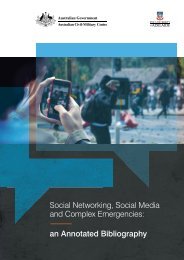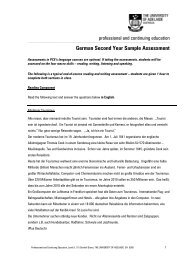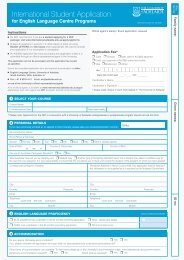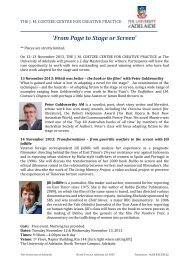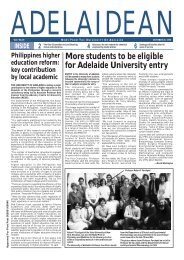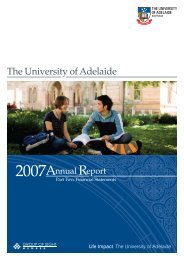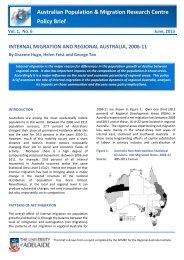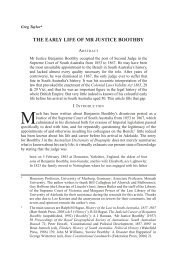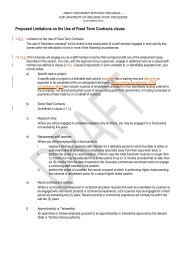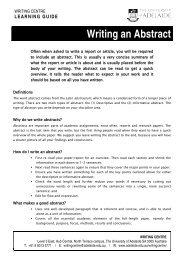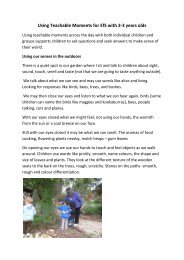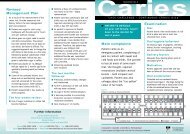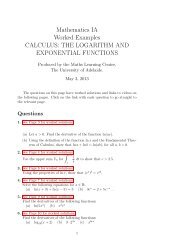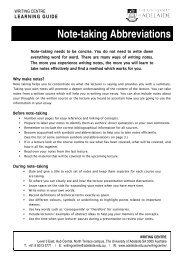Unbridling the Tongues of Women - The University of Adelaide
Unbridling the Tongues of Women - The University of Adelaide
Unbridling the Tongues of Women - The University of Adelaide
You also want an ePaper? Increase the reach of your titles
YUMPU automatically turns print PDFs into web optimized ePapers that Google loves.
Prophet <strong>of</strong> <strong>the</strong> effective vote<br />
Spence did not simply spring fully-fledged on to public platforms to urge <strong>the</strong><br />
preoccupations <strong>of</strong> her youth <strong>the</strong> moment opportunity <strong>of</strong>fered. Her preparedness<br />
to risk taking a stand on <strong>the</strong> hustings had developed, like <strong>the</strong> cause that she took<br />
with her, over several decades. It began 25 years earlier; after Howard Clark had so<br />
bungled his delivery <strong>of</strong> <strong>the</strong> lecture she had written for <strong>the</strong> South Australian Institute,<br />
Spence said, ‘I mentally resolved that if I was again asked I should <strong>of</strong>fer to read my<br />
own MS’. 47 That opportunity arose five years later with <strong>the</strong> Institute’s request for<br />
two lectures on <strong>the</strong> Brownings. As <strong>the</strong> occasion approached, Spence was clearly very<br />
nervous. She arranged for a young lawyer friend to raise his hand if he could not<br />
hear, and, as she took her place to read <strong>the</strong> first lecture, she felt, she recalled, ‘as if my<br />
knees were giving way’. 48 As might have been expected, nobody guessed that she was<br />
nervous, and her lawyer friend (later Chief Justice Samuel Way) had no occasion to<br />
indicate that he could not hear her. Spence undertook to read her own lecture, she<br />
told <strong>the</strong> Institute’s audience, because she wanted ‘to make [it] easier henceforward<br />
for any woman who felt she had something to say to stand up and say it’. 49<br />
It was undoubtedly her success with <strong>the</strong> Institute which generated <strong>the</strong> Unitarians’<br />
willingness to hear her preach her own sermons. That experience, and her participation<br />
in <strong>Adelaide</strong>’s governmental committee rooms, led her to <strong>the</strong> platform at <strong>the</strong><br />
Australasian Charities Conference in Melbourne in 1891. She read her own paper to<br />
that conference. <strong>Women</strong> had been reading <strong>the</strong>ir own papers to such ga<strong>the</strong>rings as <strong>the</strong><br />
annual congresses <strong>of</strong> <strong>the</strong> National Association for <strong>the</strong> Promotion <strong>of</strong> Social Science in<br />
Britain since <strong>the</strong> early 1860s, but women in similar circles in Australia had been slow<br />
to follow suit. At <strong>the</strong> Melbourne Charities Conference, Vida Goldstein’s fa<strong>the</strong>r read<br />
<strong>the</strong> paper that his wife had written. 50 <strong>The</strong> charitable in Melbourne seem to have been<br />
impressed with Spence: Dr Charles Strong, a former Presbyterian minister, founder <strong>of</strong><br />
<strong>the</strong> ‘Australian Church’, invited her to speak to his Workingmen’s Club. 51 She cannot<br />
have had much time for preparation, but for <strong>the</strong> purpose she resorted to her life-long<br />
preoccupation. She spoke to <strong>the</strong> workers that Strong assembled about proportional<br />
representation, building on <strong>the</strong> demand, current in <strong>the</strong> Victorian working-class, for<br />
‘one man, one vote’, her own demand for ‘one vote, one value’. 52 Spence was launched:<br />
she had spoken on <strong>the</strong> thoroughly unwomanly subject <strong>of</strong> electoral methods, in <strong>the</strong><br />
equally unfeminine environment <strong>of</strong> a workingmen’s club where she could expect far<br />
less protection than in <strong>the</strong> South Australian Institute or <strong>the</strong> Unitarian pulpit. She<br />
must have gone home to <strong>Adelaide</strong> feeling not only jubilant, but restless. <strong>The</strong> political<br />
temper <strong>the</strong>re, no less than in Melbourne, <strong>of</strong>fered her cause unparalleled opportunity.<br />
131



